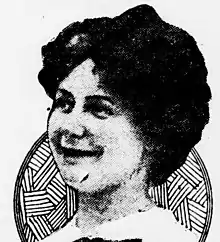Jessie Holliday
Jessie Holliday (5 February 1884 – 17 June 1915) was an English artist and suffragette.[1]

Life
Holliday's father was Henry Holliday[2] and mother, Eliza Matilda Denman. He was Secretary of the Iron and Steel Company.
Aged thirteen, she went to the Quaker school, Polam Hall,[3] for three years. She then entered the Cope & Nichols school of painting at South Kensington. There she developed a talent for drawing and painting receiving a silver medal for drawing. From 1903 to 1906 she was at the Royal Academy School of art.[4] She returned to the Royal Academy School between 1906 and 1908 for a second term.[5]
Holliday married Edmund Trowbridge Dana,[2] a grandson of the poet Longfellow, in 1912.[6][7][8]
Artistic career
The following year she began to portraiture in earnest, tackling many important socialist figures and leading thinkers. Amongst them were Clifford Allen, Hugh Dalton, Dr Somerville Hastings, the Labour MP for Reading, P.S. Florence, the statistician, and Lady Constance Lytton, the leading militant suffragette. She went on to include as her sitters George Bernard Shaw,[9] Sidney and Beatrice Webb,[10] and Blank Whites.
She became a leading light of the early Summer School Movement at which Fabian intellectuals gathered.
Holliday supported the Food Reform Movement; part of which was her own personal contribution by becoming a vegetarian.[5] At the time of her move to American she was a well known as a watercolourist and for her drawings.
Death
Holliday committed suicide by drowning[11] at Cliff Beach, Nantucket[12] on 17 June 1915, aged thirty-one years.[13] She was survived by her husband, Edmund Trowbridge Dana, and her baby son.
References
- "Jessie Holliday by Edmund Trowbridge Dana". National Portrait Gallery. Retrieved 17 November 2012.
- "Jessie Holliday – National Portrait Gallery". www.npg.org.uk. Retrieved 21 January 2021.
- The Journal of the Friends' Historical Society. Headley Brothers. 1976.
- Elizabeth Crawford (2 September 2003). The Women's Suffrage Movement: A Reference Guide 1866–1928. Routledge. pp. 499–. ISBN 1-135-43402-6.
- John Parker (1 January 1982). Father of the House: Fifty Years in Politics. Routledge & Kegan Paul. ISBN 978-0-7100-9220-5.
- Good Health. Good Health Publishing Company. 1912.
- "Finding Aid : Henry Wadsworth Longfellow (1807-1882) Family Papers, 1768-1972 (Bulk dates: 1825-1950)" (PDF). Npsd.gov. Retrieved 27 October 2021.
- "Why "The Tragedy Beautiful" took place". The Washington Herald. Washington, D.C. 11 July 1915. p. 33.
- Archibald Henderson (1911). George Bernard Shaw, his life and works: a critical biography (authorized). Hurst and Blackett, Limited.
- "Beatrice Webb, by Jessie Holliday,: chalk, circa 1909". National Portrait Gallery. London.
- Journal of Education. Boston University, School of Education. 1915.
- "Argument Settlers": What Has Happened on and Around Nantucket. A Complete History of Nantucket in Condensed Form. Inquirer and mirror Press. 1920.
- Albert Nelson Marquis (1925). The Abridged Compendium of American Genealogy: First Families of America. A.N. Marquis.